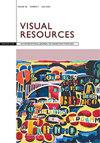The Photogrammetric Image and Black-Boxed Mutative Automation Considered through Philip K. Dick’s The Preserving Machine
IF 0.1
0 ART
引用次数: 0
Abstract
The multi-media research collective, The Preserving Machine, was initiated through collaborative discussion in response to Philip K. Dick’s 1953 short story of the same name. This article considers Dick’s story in light of current forms of image-making apparatus, specifically in relation to photogrammetry. Dick’s protagonist, Doc. Labyrinth’s design and ambitions of The Preserving Machine to safeguard cultural heritage in the light of ecological catastrophe resonates with the application of 3D imaging technologies in cultural heritage industries. However, his positionality is problematic as it both highlights the nature of preservation as being potentially extractive and does not account for the agency of the machine in the process. The text foregrounds the ways in which current computational forms of photogrammetry are conceived in the humanities, with reference to the language of post-cinema, gaming and, most importantly, photography. The argument is structured to mirror the digital production pipeline of photogrammetric processes to highlight the problematic industry rhetoric claiming objectivity, accuracy and automation. This methodology thus deals with issues surrounding the choice and capture of data input, consideration of the black-boxed processing and mutative automation and expectations surrounding reproducibility. The authors propose that current forms of conceptualising photogrammetry are insufficient to account for these hybridised digital image forms solely through the language of index, likeness and simulacrum associated with photographic theoretical dialogue. Instead, these 3D images need to be considered relationally to wider assemblages of meanings that are less readily understood through singular, coherent theoretical readings.从菲利普·迪克的《保存机器》看摄影测量图像和黑盒突变自动化
多媒体研究集体“保存机器”是针对菲利普·k·迪克1953年的同名短篇小说,通过合作讨论而发起的。这篇文章考虑了迪克的故事在当前形式的图像制作设备,特别是有关摄影测量。迪克的主角,医生。Labyrinth的设计和The preservation Machine在生态灾难下保护文化遗产的雄心,与3D成像技术在文化遗产产业中的应用产生了共鸣。然而,他的立场是有问题的,因为它既强调了保存的本质是潜在的提取,又没有说明机器在这个过程中的代理作用。本文展望了当前摄影测量的计算形式是如何在人文学科中被构想出来的,参考了后电影、游戏和最重要的摄影语言。该论点的结构反映了摄影测量过程的数字生产管道,以突出声称客观性,准确性和自动化的有问题的行业修辞。因此,该方法处理与数据输入的选择和捕获、黑盒处理和可变自动化的考虑以及与再现性有关的期望有关的问题。作者提出,目前概念化摄影测量的形式不足以仅仅通过与摄影理论对话相关的索引、相似和拟像的语言来解释这些混合的数字图像形式。相反,这些3D图像需要与更广泛的意义组合相关联,这些意义组合不太容易通过单一的、连贯的理论阅读来理解。
本文章由计算机程序翻译,如有差异,请以英文原文为准。
求助全文
约1分钟内获得全文
求助全文

 求助内容:
求助内容: 应助结果提醒方式:
应助结果提醒方式:


